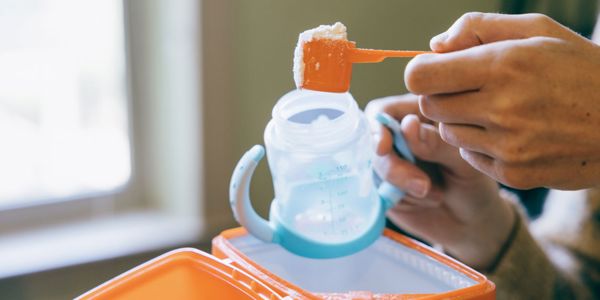There are many reasons a baby may be formula-fed, but what to do when the formula you need for your baby seems to be doing more harm than good? If you suspect your baby may have a formula allergy, read on to see what signs to look out for and what next steps to take.
Allergy vs. Intolerance
Like children and adults, babies are just as susceptible to having allergies and intolerances. A formula allergy (such as cow milk allergy) is an immunologic response while a formula intolerance (such as lactose intolerance) is a nonimmunologic response. Allergies can be immediately life-threatening and appear suddenly. Intolerances are not life-threatening on their own, but can lead to life-threatening conditions such as dehydration or failure to thrive; and are more likely to present as long-term issues that evolve over time.
Both responses can cause serious issues to your baby’s health and should be properly addressed so they can comfortably eat and safely grow.
Signs of a Formula Reaction
Sometimes a formula reaction is immediately apparent at birth, and other times it may take time to become apparent. Here are some signs to look out for:
- Anaphylaxis: If your baby is experiencing a severe reaction such as difficulty breathing, it is a medical emergency and you should call 911 immediately, even if they seem to be improving.
- Skin reaction: There may be a rash on the lips, face, around the eyes, or diaper area. This rash can be red and angry, itchy, appear as hives, or as a subtle swelling.
- Severe eczema: Similar to a rash, eczema that does not respond to treatment can be a symptom of an allergy.
- Digestive issues: Your baby may be vomiting, experiencing diarrhea or constipation, or acting colicky and difficult to soothe. They could also have a rumbling tummy and pass a lot of gas.
- Blood or mucus in stool: If you notice anything unfamiliar being passed in your baby’s diaper it is best practice to consult with their pediatrician.
- Nasal symptoms: A runny or stuffy nose, similar to hay fever symptoms.
- Poor weight gain or weight loss: This is a sign that there is something amiss with your baby’s nutrition, and their formula may be to blame.
Next Steps
If you suspect your baby may have an allergy or formula intolerance, make an appointment with their pediatrician to discuss potential causes and make a plan of action. While many parents may want to avoid an unnecessary trip to the doctor’s office or think they can proactively solve their child’s issues on their own, nutritional challenges must be addressed swiftly and correctly.
Well-intentioned parents may begin to experiment with their child’s formula brand/type and see little improvement before promptly switching to another option. Not only is this expensive and wasteful, but it could cause additional distress for your baby’s digestive system as it continually struggles to adapt to new formulas.
There is also the possibility of secondary issues such as dehydration or weight loss as a result of formula allergy or intolerance. These are through no fault of the parent and should be addressed quickly to avoid long-term issues.
Your baby’s pediatrician will be able to check for any concerns, possibly take a stool sample, and give you a concrete plan of action to confidently follow as you work together to get your baby the food they need. Because all babies are different, there may be unique nutritional needs that vary from baby to baby and the ingredients of the formula must reflect that. Their pediatrician can give you an idea of which formula to try and how long to try it before judging whether or not it is a successful change. Having a set plan can give concerned parents a measure of peace as they move forward, knowing that their baby is being properly cared for and they are not alone.
Help Your Baby at Home
In addition to working closely with your baby’s pediatrician and making necessary adjustments to their formula intake, you can try some of the following strategies to soothe and comfort your baby through the change.
- Burp often during feedings to avoid gas build-up
- Walk/bounce/pat your baby gently to help displace stubborn gas bubbles between feedings
- Rub your baby’s back to calm and relieve gas
- Consider swaddling to see if this is soothing for your baby
- Provide smaller, more frequent feedings
- Play calm sounds or music to soothe your baby
- Do not excessively move/bounce your baby immediately after feedings
Takeaway
You know your baby best. If you sense something is not quite right with how they are acting in response to their formula, advocate for them quickly and confidently. You are your baby’s best advocate.







